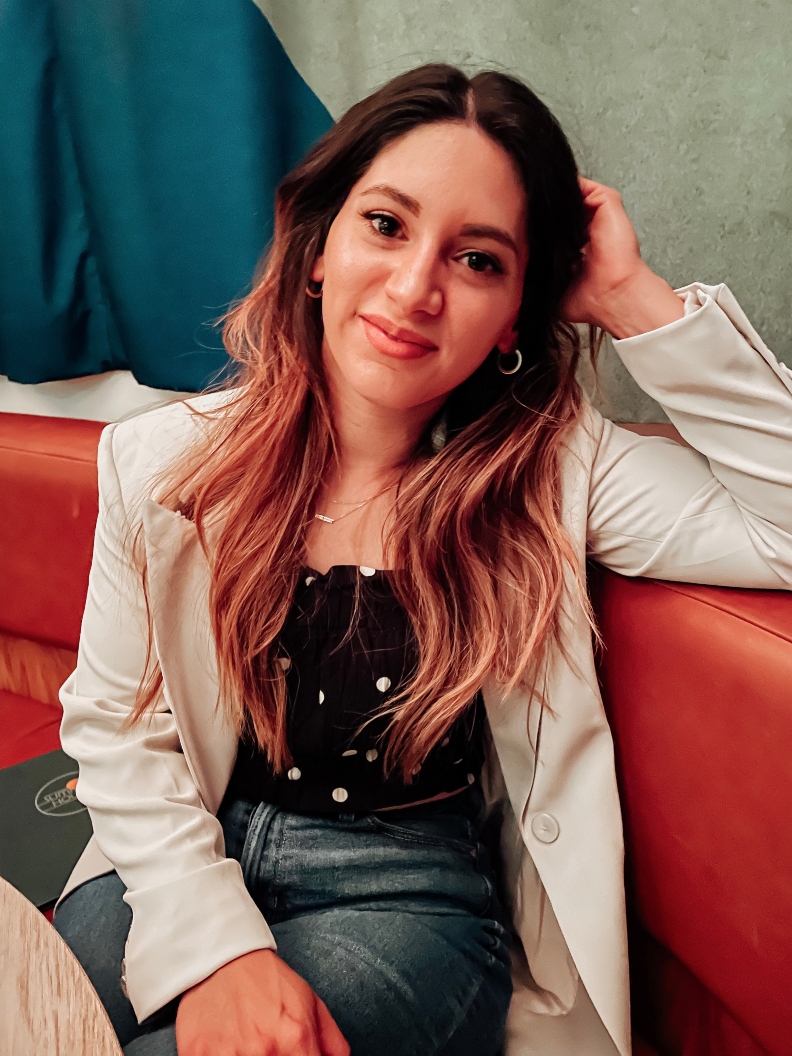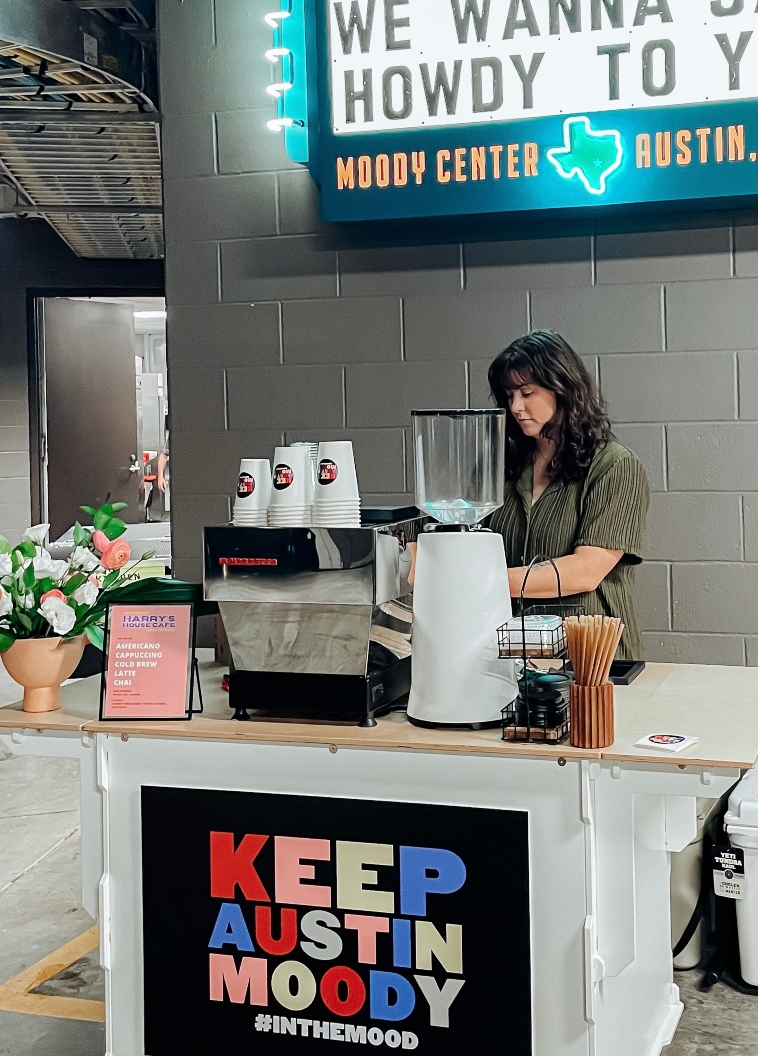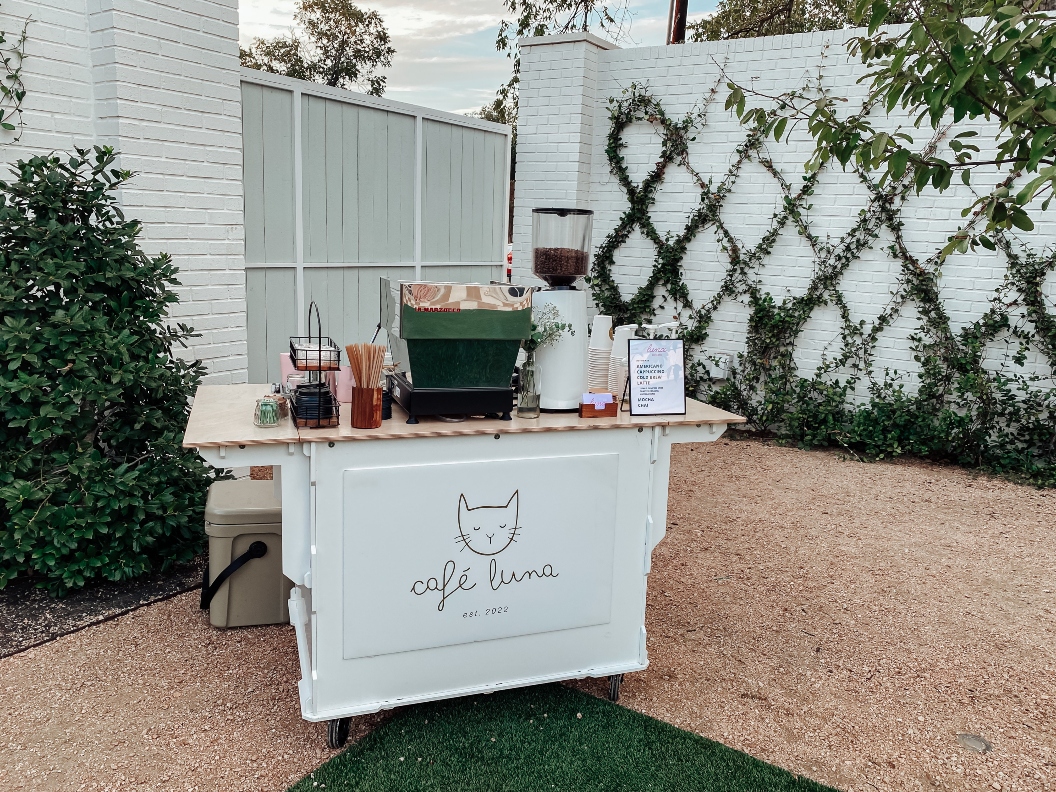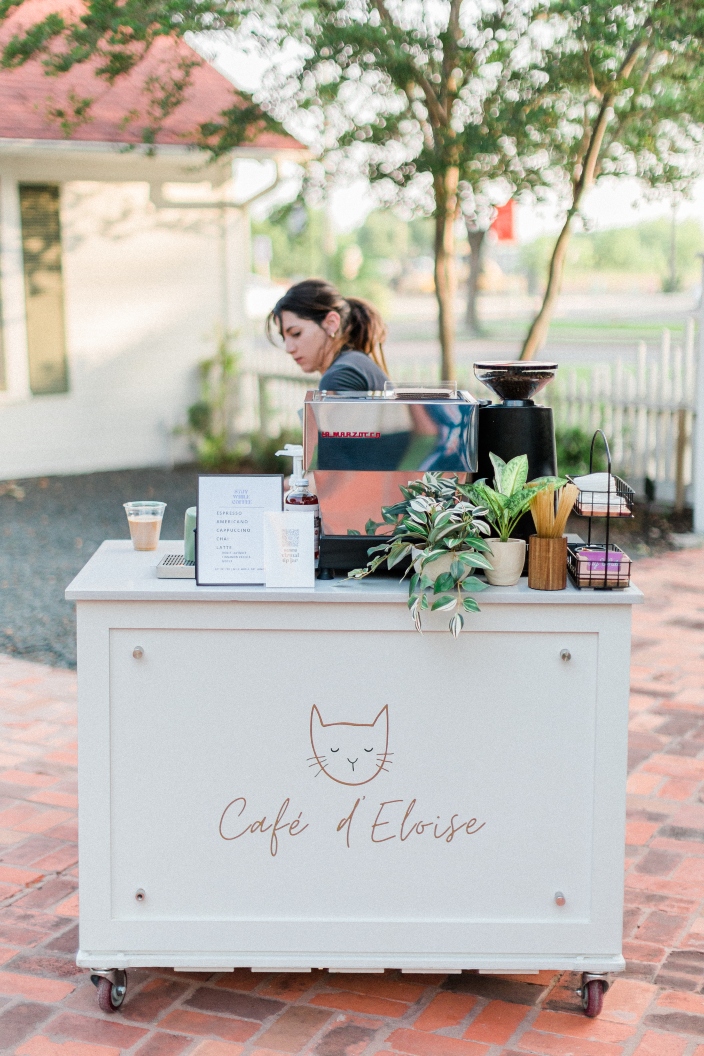Despite a seemingly nonstop schedule, Luna Espresso Founder Danielle Garcia finds herself in a happy place.

By Cy White, Photos courtesy of Danielle Garcia
Danielle Garcia had an eventful year. Rebranding her brick-and-mortar to a mobile coffee shop; creating an evergreen partnership with the Moody Center; a revolving door of clients from all over the state. Oh, and the little detail of Yelp naming Luna Espresso as one of the Latino Businesses to Watch. Never mind the fact taht she still has a full-time job. Yeah, Garcia has been busy. Despite what seems to be a never-ending schedule of events, however, she finds herself in a truly happy place. “I feel like I can’t complain about being busy because it’s great business.”
At the time of this interview, Luna Espresso was booked for double weddings in one day, a wedding in Dripping Springs and three major artist catering events at the Moody Center (including Lizzo). She and her wife did manage to squeeze out some time for themselves and their 6-month-old fur baby. In the midst of running between different venues around Austin, Garcia took some time to answer questions about her journey.
Tell us about the Stay While origins.
Stay While started February of 2020, so clearly right before the epidemic hit. I always had the idea of being an event space business, having a traveling mobile coffee cart. Then obviously, we didn’t really know. We had delayed startup into this business, but primarily, I started it because a I love coffee. I did coffee in college and always liked that interaction between creativeness and the technical side of coffee, which was pretty cool.
I grew up with a single mother, and she was always doing a million different things. So, you know, I kind of adopted that mentality as well. Throughout high school, I did little passion projects and had little tiny businesses. Not even businesses, like tea shops or something. I started in high school; I would paint on TOMS shoes for people. That was fun, but I’ve always had an interest of filling up my time, in high school or in college. I was a waitress, a nanny. So I always just needed, you know, a million different things going on. Obviously, that kind of transformed into entrepreneurial stuff when I was out of college and a little bit more responsible and ready for that.
You can ask my friends; they’ll probably tell you they’ve heard everything under the sun. I’m gonna start this business, or I’m gonna do this. So I eventually was like, “I want an espresso machine in my house,” and was like, “How do I do this?” I ended up telling my wife, ‘I’m gonna start a mobile coffee cart business.’ I had seen them popping up in California, and it seemed like a great concept. It seems like something tangible that I can actually do without a whole bunch of funding. It seems a little bit more attainable. So I started that whole process.
For me, it was, not really finding exactly what I wanted to do, but having the courage to do it. My friend sent me over a podcast called “How I Built This.” It’s just a podcast about a bunch of business owners who have done really well for themselves, really well known companies and their story, but it kind of more focused on their failures and the obstacles that they had. Really how they started it. So it was really interesting for me to hear all of these stories. I was like, “Well, they don’t know what they’re doing. I don’t know what I’m doing. But I can do this. I’ll figure it out.”
So, January, I was like, “Okay, I’m going to do this.” And yeah, I just got a DBA, started it up. I feel like it’s been a mixture of luck and hard work. And now we’re here, and we we had like 26 events [in September]. So it feels like it’s finally catching some tread, and it feels great.
Can you tell us a little about how you started working with Moody Center?
It’s funny, we haven’t worked with each other for that long. I think our first request with them was maybe [three]months ago. But since then, we’ve done almost every event. We did every [concert]in October. Our first event together was Leon bridges. Honestly, it was just an email. Their branding team reached out and was like, “Hey, we want to offer this experience. We love your coffee cart. What can we do?” And we just responded at the right time, I guess. It was a bit of luck.

My best friend is our catering coordinator, so she responds to the emails, and she was like, “Oh, my gosh, Leon bridges!” That was by far the coolest thing I’ve done, or was going to do at that point. Obviously I wanted to be really quick with responses. Immediately after, they were like, “Come back the next day with us as well. We have Kevin Hart coming.” I was like, “Of course.” Everything was just so easy. I think the partnership just worked really well for both sides.
Fast forward, up until now. We’ve done I can’t even tell you how many events with them. It’s just kind of this rolling thing, and we’re hoping to build a custom cart to stay there so that we can just kind of pop up a little bit more easily. It’s good. Those people work way too many hours, like, way too many hours. It’s kind of a cool thing for artists to walk by and see. Like, they’ve got a cool little sign lined up. If you see our Instagram, they always have fun little like puns or words written for the artists coming. All of those people have been up 20-something hours at that point. They love espresso. To interact and hear their stories and, be around that environment. It’s just so energetic.
Luna Espresso is touted as a safe haven for Austin’s queer community. Tell us why this is so important to you.
Obviously, being queer myself is a huge part of it. I grew up in a town kind of near Fort Worth area; it’s a tiny town you probably wouldn’t know it. It was very religious based, and I met my wife in high school. At the point when we met, it wasn’t accepted as much. That kind of delayed are coming out. We didn’t really really embrace that part of us, which is sad to think now, until we moved off to college. It even took us a few years after that. I’ve been with her for 10-plus years now. So it’s really strange to talk about how we used to call each other roommates. But we did that. It’s so sad to think that queer people especially have similar experiences, or maybe even worse. They don’t feel comfortable working in some environments.
So that was a huge part for me, especially working with The Little Gay Shop. It was like having that space where you could just come and shop and you could grab a cup of coffee and just truly be yourself and not have to worry about any judgment. That’s kind of stayed with us, even leaving The Little Gay Shop. We stopped doing the brick-and-mortar Sept. 15, the day after my birthday, to just focus on caterings. I still wanted to bring those people with me, and primarily my team right now is queer people. It’s just nice.
That’s one big thing that I’d like to focus on, just having a safe environment and workplace. I know it’s a hard time to go through when you’re not completely out, or if you’re not the “normal” person that people expect when they hire a catering company. But having that open conversation and making this environment easy for them to kind of fit into is really important.
I think within Austin, the reason why I started the coffee shop is all of these coffee shops, great, you know. We have so many to go to, but they’re all kind of like that really industrial feel. Not really a lot of colors. And in terms of ownership, there wasn’t a lot of diversity in there as well.
So I wanted to be the exact opposite. I was like the queer Latina woman coming in, relatively young. I’m not sure if I look way younger than I actually am, but I’m a little bit younger. Having that kind of mentality of, “Hey, we’re here, and it’s just gonna be this one environment.” But not too seriously; I want to have these bright colors incorporated into our logos and fun things. Kind of like, “We’re here, and we employ queer people. We are open to anything and everything. Just come in and enjoy this cup of coffee and have a better day.”
The Little Gay Shop had a bunch of Pride festivals. Bringing coffee to those experiences was really cool, because most people only have, like, bars. Focusing with the queer community, specifically on coffee, it was a no-brainer and also an avenue of a conversation without alcohol. It feels really good to also be able to really experience and see those people who are younger than 21. That was the coolest part about the coffee shop. Obviously catering is a little bit different. You don’t really get to pop up wherever. Hopefully once we have a little bit more availability, we’ll be able to do some more markets and do some other things with the community specifically.
I think now more than ever it’s important for women of color to stand up and shout from the rooftops that they are powerful and really set the tone for culture. How important is representing the Latinx community for you?
It’s really important. I was just reading something. There was a statistic on Latino- or Latinx-owned businesses. I think it’s like 1 in 4 actually Latinx-owned, which was pretty cool. We’re so hardworking. The biggest obstacle is just giving space and giving confidence to these people to actually start what they want to do. My mom, for example. She makes so many foods and things. I’m always like, “You just need to start your own little food truck. We’ll start your food truck; I’ll figure it out for you.” And she’s just like, “Oh my goodness, [it’s] not that great.” She just needs that confidence booster, which I feel like so many people just need that. They need to understand, even though you feel like you’re not fully prepped to start a business, you can do it. Specifically in empowering people from my culture, it’s like, it’s a huge thing.

I don’t think I would have started the business without meeting people who were me. Through this process of starting this up, it just gives you a little bit more relatable experience. So I definitely put that at the forefront for myself. Being queer and Latina, because I want people to come up to ask me, “Hey, how did you do this?” I want people to use me as a resource. There’s been so many times I’ve paid for people to be resources. I want to give you more information than you want, and you can do what you want with it. And I want to be there and to empower you, especially if you’re queer, or if you’re Latina. Please come to me.
I wish I knew Spanish. I wish my family would have taught me, but my family was kind of the people who were like, “Let’s focus on English.” Not really gonna speak a whole lot of Spanish in the house. For me, that’s sad. But if you’re learning English, you should still have the confidence to start a business.
With the Yelp distinction of a Latinx-owned business “One to Watch,” you have the world’s attention. What do you believe makes you exemplify what it means to be “One to Watch”?
I think there’s a few things. One, with the pandemic, in all of these businesses closing or business starting, I think people have turned to be really intentional of who they support. Or at least that’s kind of how it feels in Austin. I think that’s one thing that’s kind of prevalent. We’re really focusing on who do we support? Why do we support them? I’m gonna buy from them because I support what they’re trying to do. So, I feel like that’s a big portion of it. I have to recognize that.
Then also I think within the coffee scene, it’s a new trend of this mobile coffee cart. People are really gravitating toward that. Especially with the pandemic, it’s like we lost sight of so much communication and connection with people. Now companies are going back to the office or looking at how do we better this experience and bring people back and [get them]excited to get back to work and seeing each other. Coffee is a great avenue of , “Oh, we have cool coffee bar!” Some really cool businesses have their own espresso, barista, and all that stuff. For the ones that don’t, we’ll bring this to you. It’s a cool experience for y’all to get together, talk with each other and enjoy a cup of coffee.
I think it’s just that whole concept of bringing this creative really yummy experience to these things that people wouldn’t normally have. Really, all we need is an outlet. We can almost go anywhere. We’ve seen park weddings, and obviously Moody Center. I think people gravitate toward like, “Oh, this person had a coffee experience at their wedding. What’s that about? Let me do that.” They see me popping up at Florence + the Machine backstage, and they’re like, “That’s pretty cool.”
So I think that’s probably it. I’m not really sure. I feel like I’m very humble and modest about a lot of things. So like even doing this, I was like, “Oh my God. Why did they want to talk to me?”
What have been some of the most rewarding aspect of starting and maintaining your own business?
Honestly, I think there’s probably two that stick out. One is just seeing the connections that it produces. How coffee can be that connection between people. Then two, it goes back to just having connections with the people you work with. Obviously, keeping my employees on from the coffee shop was really important to me. That transition really stressed me out because, you know, I don’t want you to think we’re just closing and this is the end of y’all. Please stay on if you want to do this catering business with me. I was presenting all of the fun aspects. Seeing that transition was like a really cool experience of being able to pay my baristas more than what I could and what’s standard for baristas in Austin.

Two, I think being able to incorporate my family and my wife into the business was really cool. Being able to better provide for my family in terms of supporting our lifestyle. But I think the most rewarding part is just having friends and family come to me and be like, “I eventually want to do this for your business. And this only. Like, I want to quit my job and do catering coordinating for you.” Like my brother wants to be a logistical manager. My mom coming to me and saying she’s proud of me. Yeah, I think that’s the most rewarding part. Seeing how people are coming to me and saying these things. And I’m just like, “Oh, I did craft this. I did do this.”
Just the people involved, the amount of interactions we get is so important. I think it’s even so much more nowadays, given the pandemic and everything. It makes it even more special.
What advice can you give woman-identified Latinx entrepreneurs out there who are just starting out or might be struggling to find their footing/their place in their industry?
Honestly, the biggest thing for me is give yourself confidence. I know it’s hard because, even for me, it took me a long time to act upon that. It wasn’t until I listened to these stories of people starting these businesses and I was like, “Why can’t that be me?” I would say if you’re really passionate, and you really love this concept of what you want to do as a business, start simple. It doesn’t have to be this big, scary thing. I definitely started just telling people what I was doing. Then people would come back to me and be like, “Hey, you’re doing this thing, right?” I’m like, “Yeah, you know, I haven’t really done much.”
So just be intentional. Create that conversation, because you never know what connections you’ll get from the conversations you have of just sharing your love and your passion. Sometimes you just kind of have to, I hate the the term “fake it till you make it,” but honestly, sometimes you do that. I remember my first purchase was a cup stamp that said, “Stay wild, coffee hard.”
I took it with us and went with my wife down to Galveston to look at wedding venues. We stayed at this beautiful boutique hotel, very picturesque, and I remember placing a lid on the cups. And I was staging photos like, “Hey, [I have] this new concept coffee cart!” One of those first photos is like I had nothing at that point. All I had was a stamp and some cups. Fast forward that night, and I’m talking to the coordinator at the hotel. I’m like, “I have this coffee cart business. If you want to have coffee for these weddings that you have this month, let me know.” I had nothing at that time. It was totally not even like a full business. You just have to start somewhere.
Just putting that out there and starting small, having those people check in with you. Feeling like, “I have this urge to act upon this now. So many people know about this concept, and I can’t just stop here. I got to do something,” is the biggest thing. It gives you confidence when people are like, “Hey, that’s a great idea. What are you doing with it?” Start small start, with little steps, and everything will kind of come together eventually.
Sitting here today. I’m like, “Wow, that’s a lot of things that I did.” Which seems crazy, but also really beautiful to see it all come together.?

